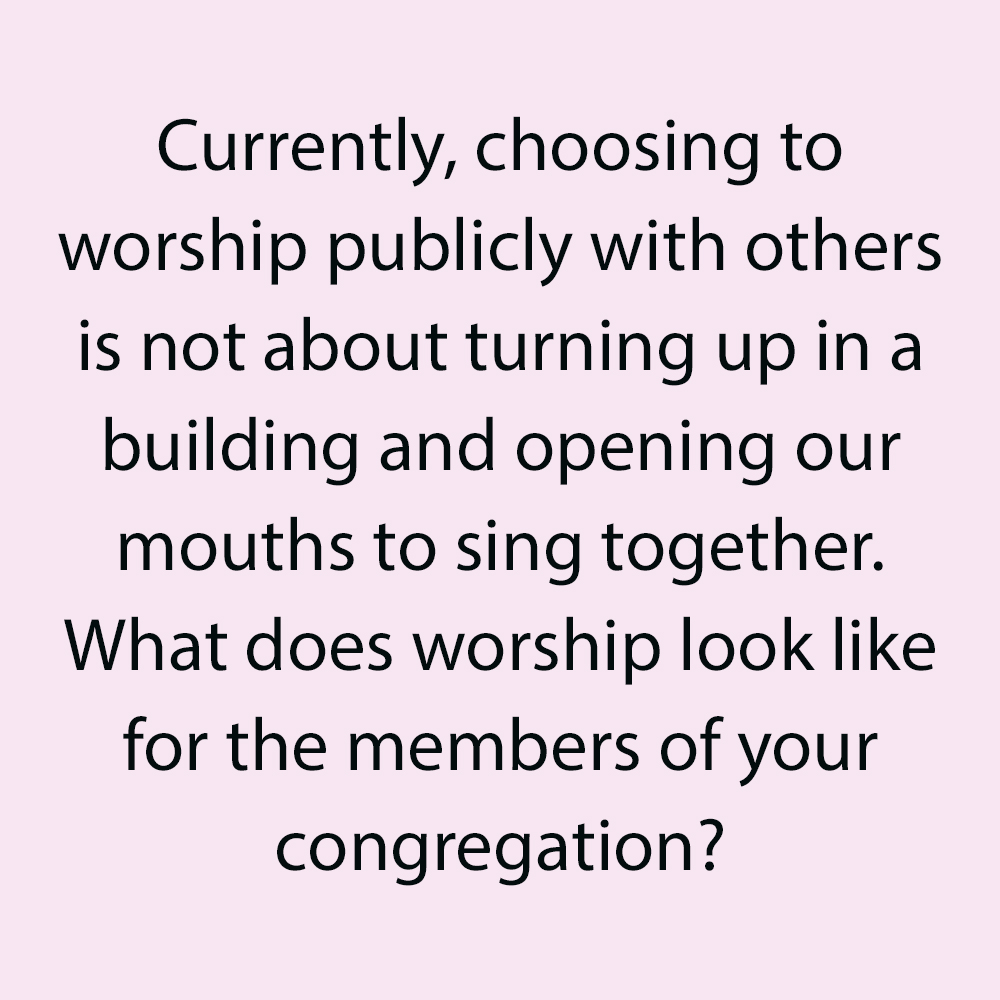
A New Song
‘There are many reasons why the current absence of congregational singing is strongly felt. But while I miss it too, I am mindful that worship is more than the songs we can sing’, writes Shona Shaw
Not being able to gather with others and sing together on a Sunday morning has felt like a bereavement for many. I am conscious that there are real bereavements and much greater losses being suffered in our wider life at this time. However, the loss of congregational singing from our weekly rhythm of worship is indicative for me of its important place in our Baptist life together.
Of course if you go further back in our history, there was a time when congregational singing was viewed with suspicion. The question of a congregation singing words other than scripture, and set to secular tunes was viewed, by our predecessors, with distrust. While 18th century Baptists recognised the evangelical potential of congregational hymn singing they feared that allowing ‘worldly tunes’ might lead to ‘worldly’ thoughts and ideas infiltrating the sanctity of the church’s worship.
They were right of course: the songs we sing together do form and shape our feelings, our thoughts and our behaviour. Eighteenth century Baptists recognised this in the unique power of words and music to heighten our emotional engagement in worship. Throughout our history every congregation has had their unofficial anthems which are guaranteed to elicit full throated singing. Over time these hymns and songs have become loved by a congregation because they resonate with their shared testimony. Rather than being credal in our confession as Baptists, we proclaim our faith in song.
This unease over the extent to which ‘the world shapes us, we shape the world’, in sung worship has never really left us. For Baptist churches that have switched to on-line services during the pandemic, the choice of songs used in their worship has no doubt ignited the debate once more. There will be unease for some engaging with a slick and secularised social media platform, promoting an industry and culture of which Sunday worship is usually oblivious.
These troubles are not new, and I have no intention of swinging into a debate at this point. What I would like to reflect upon is what we are missing in the absence of congregational singing and what our response might be given the pandemic has put a temporary pause on this aspect of our congregational life.
When we sing, we are engaged in physical activity. That may sound obvious but it is probably the most exercise you will participate in at church on a Sunday morning, unless you are running the children’s work. It is an activity that involves your whole body, not just your mind. As such you breathe more deeply, your body resonates with sound and your breathing is attuned to the rest of the congregation as it ‘synchs’ with the song. You are making something with other people, using your body. And these are not just any people, these are the people you know and with whom you share your life. As we sing together we are aware of the clay jar: the imperfections, the struggles and the triumphs of our ordinary life that resound with worship of Father, Son and Holy Spirit.
There is something precious in our contextual and ordinary offering of worship. We can see this element reflected in the different renditions of The Blessing
1 that appeared at the beginning of lockdown last year. For many, not just Baptist churches, this was an opportunity to bless a wider community beyond the church. But significantly, in doing so, it allowed distinctive voices and contexts to be heard and seen. The Blessing illustrates that we continue to have an opportunity to be heard and seen, singing our story whether our buildings remain closed or not.
There is nothing passive about congregational singing: it takes our will to decide to go to church and physically join in. Even if the words of a song irritate us or the musical style is not to our personal taste, we are invited and choose to make a joyful noise as one body.
The physicality of singing with others enables us to form together in sound, and this detracts attention from ourselves to focus on the One who ‘Opens our lips’ as the Anglican liturgy reminds us. There is something spiritually grounding in our physical gathering and singing. We have an audible sense that the body of Christ is present as we encounter one another in song. Congregational singing allows us to experience a unity in performance that can be elusive or fleeting in the rest of our congregational life together.
Our decision to participate in gathered worship during the pandemic may depend upon the complexities of risk assessments and protocols, advance booking or logging on-line and hoping our internet connection is having a good day. For many of us the immediacy of feedback that we receive from a weekly service is temporarily paused; it is not so apparent if we have ‘attended church’. The body in song is dispersed and silent as we ‘watch’ or at best sing along, but our sung worship is not so dependent on us making a joyful noise: we cannot hear or see one another in the usual way.

While I miss singing with my fellow members, I am mindful that worship is more than the songs we can sing.
Gale Richards in her contribution to Listening to God spoke of the decentering of music during the pandemic and the re-emphasis on testimony and offering our whole lives in worship. The importance of testimony and shared story has not disappeared from our lives together, but these elements have found a diversity of expression that should be encouraged and nurtured. This will take our individual decision to offer our lives in worship but also to pursue this as congregations. Currently, choosing to worship publicly with others is not about turning up in a building and opening our mouths to sing together. What does worship look like for the members of your congregation? I imagine we would see a diversity of practices that have been faithfully improvised for each locality.
Perhaps even more importantly, Richards observes we are being invited to embrace lament. Lament gives voice to feelings and thoughts that we are unused to expressing corporately. There is an opportunity for song-writers to explore this genre and in doing so broaden the expression of our shared testimony.
And to lament I would add silence. Silence is just as much a part of our worship: rather than being a negative experience, we can allow our voices to fall silent in order to hear what God might be saying. Do we need to give space for God’s Spirit to sing over us his songs of comfort but also challenge? Who can forget the warning from Amos, that our worship gatherings can become echo-chambers for our own entertainment:
‘Away with the noise of your songs! I will not listen to the music of your harps. But let justice roll on like a river, righteousness like a never-failing stream!’ Amos 5: 23-24
Particularly as we continue to stream services and have restricted numbers in our buildings, the temptation to hold onto the aspects of our worship that reassure and are familiar is real. During the pandemic we have been reminded of the opportunity we have to sing our story for a wider world. But, for our songs to come from a place of lived and shared faith, this will take time and genuine engagement from the whole body.
Then we will have something to sing about:
‘Let the amen
Sound from God’s people again:
Gladly for aye we adore him’ 2
This article was first published in the Spring 2021 edition of
Baptists Together magazine. Click here to
download a pdf version of this article.
 Shona Shaw
Shona Shaw is a Baptist minister in North Leeds, and has written on congregational singing in
Gathering Disciples (2017)
1 The Blessing, Kari Jobe, Elevation Worship, Cody Carnes, 2020.
2 Praise to the Lord, the Almighty the King of Creation, Joachim Neander,1680
Photo: Jantanee | lightstock.com
Baptist Times, 18/12/2020